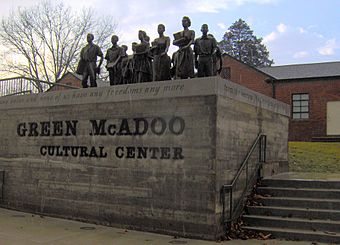Green McAdoo School facts for kids
Quick facts for kids |
|
|
Green McAdoo School
|
|

View of the front of the Green McAdoo Cultural Center, including the statues of the "Clinton 12" next to the steps that lead to the entrance.
|
|
| Location | 101 School St. Clinton, Tennessee |
|---|---|
| NRHP reference No. | 05001218 |
| Added to NRHP | November 8, 2005 |
The Green McAdoo School in Clinton, Tennessee, is a very important place. For many years, it was an elementary school for African American children. This was during a time when schools were segregated. This means Black and white students were kept separate.
The school building was finished in 1935. It was designed by an architect named Frank O. Barber. Today, the Green McAdoo School is a museum and a cultural center. It is also listed on the National Register of Historic Places because of its historical importance.
Contents
The Green McAdoo School: A Place of History
The Green McAdoo School served its community until 1965. After it closed, the building started to fall apart. But people knew its history was too important to lose. So, it was renovated and reopened as a museum in 2006. Money for these repairs came from federal grants and local government.
The Clinton 12: A Brave Step
Outside the school, you can see life-size bronze statues. These statues honor the "Clinton 12." These were 12 brave African American students. In the fall of 1956, they attended Clinton High School. This was a big moment because it was the first time the high school was desegregated. This meant Black and white students could finally go to school together. A court order made this change happen.
From School to Museum: Preserving History
The Green McAdoo Cultural Center helps everyone learn about this important time. It teaches about the history of segregation and desegregation. It also shares the stories of the students and community members.
Becoming Part of the State Museum
In 2018, the Green McAdoo Cultural Center joined the Tennessee State Museum system. This means it is now part of a larger group of museums. This helps even more people learn about its history.
 | Bayard Rustin |
 | Jeannette Carter |
 | Jeremiah A. Brown |


